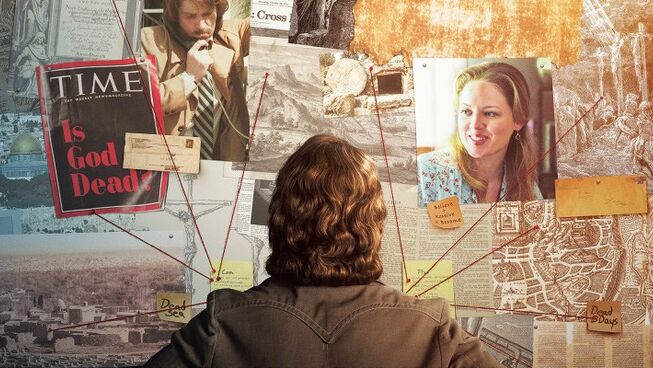
'Love always leaves a mark'
Walking into the cinema...
When a book that attempts to answer some of life's bigger questions about God sells over 20 million copies and is made into a major motion picture, The Shack deserves some consideration.
 The Shack has proven to be a phenomenon in Christian literature. William P. Young’s novel is about one man’s journey to finding the answers of the universe after a tragedy irreversibly effects their family. It was written by Young to share his views on God and where the Creator is during difficult times in people’s lives. He relied on his study of the Christian faith to deliver this unique allegory. It has lead to multiple discussions within theological and church circles on its value in helping people to connect with God in troubled times. With it being made into major motion picture, the concepts it presents to audiences deserve consideration.
The Shack has proven to be a phenomenon in Christian literature. William P. Young’s novel is about one man’s journey to finding the answers of the universe after a tragedy irreversibly effects their family. It was written by Young to share his views on God and where the Creator is during difficult times in people’s lives. He relied on his study of the Christian faith to deliver this unique allegory. It has lead to multiple discussions within theological and church circles on its value in helping people to connect with God in troubled times. With it being made into major motion picture, the concepts it presents to audiences deserve consideration.
The story centres on Mack Phillips (Sam Worthington) and his family who live in the northwest of the United States. They are a close knit family who love their life together, attend church and seem to live an idilic lifestyle in suburbia. While Mack is on a camping trip with his three kids, a tragic event occurs that leads to the death of their youngest daughter, Missy (Amélie Eve). This moment of distraction shatters life's veneer for the Phillips family and hits Mack the hardest. Blaming himself for the events during the outing, he isolates himself emotionally from his wife and remaining kids. Then one day he receives a mysterious note that seems to say that God is trying to communicate with him. In an attempt to find the answers to his own personal despair and behind the strange note, he heads to the shack where Missy lost her life. Upon his arrival, he is confronted with the answers to his questions and the revelation that God desires to have a relationship with him.
 The challenge in reviewing a film as a Christian is wrestling with the quality of the film and the value of the theological content. In an attempt to address both issues, the best tactic would be to seperate the two discussion points and judge them on their own merits. The easier of the two is the evaluation of the production quality. The notoriety of the book has drawn the acting talents of Sam Worthington, Octavia Spencer and Radha Mitchell to this project and this talent pool does lift the quality of the film above the standard Christian film. It should be said that this is one of Sam Worthington’s best performances and he does manage to portray the grief and emotional challenges of Mack. He could not ask for better support than Academy Award winning actress Octavia Spencer. She delivers an effective portrait of Papa or Mack's wife's name for God. The acting is above average, but it does get bogged down in the details of Mack’s spiritual journey. Director Stuart Hazeldine (Exam) benefits from an excellent cast, but he does not seem to know when to edit the film. The journey was emotionally charged, but becomes an arduous and drawn-out outing. There is a hope that this bereaved father would get relief from his pain, but the overall experience will cause audiences to wish for relief and for the journey to come to an end.
The challenge in reviewing a film as a Christian is wrestling with the quality of the film and the value of the theological content. In an attempt to address both issues, the best tactic would be to seperate the two discussion points and judge them on their own merits. The easier of the two is the evaluation of the production quality. The notoriety of the book has drawn the acting talents of Sam Worthington, Octavia Spencer and Radha Mitchell to this project and this talent pool does lift the quality of the film above the standard Christian film. It should be said that this is one of Sam Worthington’s best performances and he does manage to portray the grief and emotional challenges of Mack. He could not ask for better support than Academy Award winning actress Octavia Spencer. She delivers an effective portrait of Papa or Mack's wife's name for God. The acting is above average, but it does get bogged down in the details of Mack’s spiritual journey. Director Stuart Hazeldine (Exam) benefits from an excellent cast, but he does not seem to know when to edit the film. The journey was emotionally charged, but becomes an arduous and drawn-out outing. There is a hope that this bereaved father would get relief from his pain, but the overall experience will cause audiences to wish for relief and for the journey to come to an end.
 REEL DIALOGUE: On the theological front, William P. Young does prove that he is not a biblical scholar. It is well-documented that he never intended to prove his scholastic prowess, but wanted to deliver a story that was accessible for his children. The message is strong on love and weak on judgement, which unwittingly undermines the heart of the message. Combined with the uncommon personification of the Trinity, the theological calisthenics becomes an exhausting struggle. This is where discerning individuals will need to determine which portions are actual messages of the Bible and which are merely artistic elements formulated by the author. As the film concludes, the theological content delivers a message that is ultimately hollow as opposed to being hopeful.
REEL DIALOGUE: On the theological front, William P. Young does prove that he is not a biblical scholar. It is well-documented that he never intended to prove his scholastic prowess, but wanted to deliver a story that was accessible for his children. The message is strong on love and weak on judgement, which unwittingly undermines the heart of the message. Combined with the uncommon personification of the Trinity, the theological calisthenics becomes an exhausting struggle. This is where discerning individuals will need to determine which portions are actual messages of the Bible and which are merely artistic elements formulated by the author. As the film concludes, the theological content delivers a message that is ultimately hollow as opposed to being hopeful.
In the final analysis, it is apparent that the intentions of the author were meant for good and he does provide an interesting view of the grieving process and God. His intentions were to help the healing process by providing simple answers to life’s bigger questions. The difficulty is that the essence of the good news gets wrapped up in a feel-good message that misses the primary target mark. Interestingly, the film and book show that life is a beautiful mess that God wants to help him through. The Shack contains some beautiful performances, lovely visual elements and it has the potential for an inspiring message, but merely becomes a beautiful mess.
If you are hurting, one of the best books on the subject of suffering:
If I were God, I’d End All the Pain: Struggling with Evil, Suffering and Faith by John Dickson
Written by Russell Matthews based on a five star rating system @ Russelling Reviews #russellingrevs #theshack #suffering #thetrinity #samworthington #octaviaspencer




